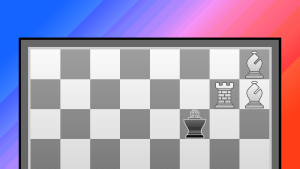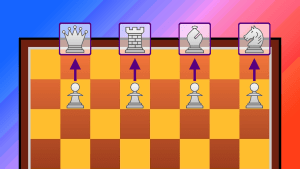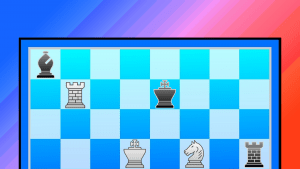
During Game 13 of the World Championship match between Gukesh and Ding, I was watching the livestream on Chess24 where the commentators (both terrific) were GM Peter Leko and GM Daniel (Danya) Naroditsky. When Gukesh played 15.Nh5 (see diagram bel...

Retro-analytical problems, where solvers logically deduce what must have occurred before a given position is reached, include many interesting sub-genres. Proof games are a popular type that’s introduced in this blog. Another sub-category th...

The late Sir Jeremy Morse authored Chess Problems: Tasks and Records in 1995, and an updated edition of this definitive work – devoted to compositions showing all kinds of maximum effects – appeared a few years later. In 2016, a substa...

The AI advances of recent years have spawned a wealth of impressive tools, from ChatGPT which creates human-like text, to AlphaZero which plays top-level chess. Another type of AI application that has become very popular is text-to-image models: t...

The name Dark Doings refers to composed problems in which the white force consists solely of the king and one other unit (if any), while Black possesses the full set of sixteen pieces. This maximum contrast in materials creates arresting diagram p...

As the strongest chess engine of today, Stockfish is unsurprisingly capable of solving most forced-mate problems of reasonable length. Indeed, it generally cracks even complex composed problems that are under 10 moves in mere seconds. That’s...

Composing chess problems is a creative art that takes skill, time, and effort, so it’s only natural that when an original work is published, it’s always accompanied by the author’s name. It’s also normal, when quoting a pro...

The theme of a chess problem often involves a recurring motif, where certain effects are repeated in a variety of ways. Since checks are one of the most basic tactical effects, it’s natural to consider multiplying them as the focus of a comp...

Chess problemists, even the finest ones, generally have a “day job” because problem composing (unlike top-level chess playing) is not a professional activity. The question arises as to which problem composers have become so successful ...

Promotion play, especially the surprising need for underpromotion, is a popular feature in composed problems. The Allumwandlung theme amplifies this idea and it indicates that all four types of promotion – to queen, rook, bishop, and knight ...

In popular culture and films in particular, chess has become a shorthand for “a battle of wits between two intelligent characters.” As such, chess-playing scenes are plentiful and I had no shortage of highlights to choose from for my e...

The renowned GM Judit Polgar organises an annual Global Chess Festival in each October, and the 2021 edition includes an event called the Chess Artistry Competition. This is a composing tourney aimed at promoting endgame studies to chess players, ...

According to chess laws, a piece that’s absolutely pinned to its king still retains its power to check the opponent’s king. There are good reasons for this rule, and yet in the end it’s only a matter of convention. There is in fa...

What makes chess puzzles, problems, and endgame studies sound – or unsound? Why do some puzzles seem to contain “sub-optimal” moves by the opposing side? Is a problem or a study faulty if its thematic variation isn’t appare...

The terms chess puzzles and chess problems may seem synonymous at first glance, but when used precisely, there’s actually a world of difference between them. Both terms refer to special positions in which solvers try to uncover the known &ld...

Many readers will be familiar with tablebases, software that effectively plays perfect chess in certain endgame positions. If you’re new to the subject, though, refer to my introductory Adventures with endgame tablebases. As discussed in tha...

In a type of chess problem known as synthetic games, the task is to construct a game starting from the normal array to reach a position that meets a certain objective. Since you control both sides, the play is no longer adversary, but the challeng...

‘The Queen’s Gambit’ is a new TV mini-series (produced by Netflix) in which chess plays a central role. Based on the 1983 novel by Walter Tevis, it’s a coming-of-age story about an orphaned girl named Beth Harmon, who strug...

The Marvel Cinematic Universe is a stupendously successful sci-fi/superhero movie franchise that spans 23 films over 10 years, in a series called the Infinity Saga. Unlike the X-Men movie series, which employs chess as a recurring motif (see my ea...

A pawn must be replaced by a piece upon reaching the eighth rank, but suppose it is legal for the unit to remain as a pawn, one that becomes immobile. Are there situations where such a non-promotion move would be the best possible, i.e. the only m...

Two special moves in chess, castling and the en passant capture, differ from other moves in that their legality depends on not only the current position, but the prior play as well. An issue arises in composed problems when these types of moves ar...

The Christmas competition announced in my previous blog, presenting three unconventional chess problems to be solved, is now completed. The number of entries was good, but more importantly, readers who took part generally expressed how much they e...

The festive season is upon us, so let’s celebrate with a fun problem-solving contest with prizes! It’s something of a Christmas tradition for chess problemists to send one another greeting cards diagrammed with their own compositions &...

Last year my Adventures series of blogs examined endgame tablebases, software that provides perfect play information for any positions with up to seven pieces. I reviewed the remarkable capabilities of these programs – they play as God effec...

The legendary grandmaster and problemist Pal Benko has passed away on August 26, at the age of 91. He was one of the very few world-class players who also excelled at chess composition, adept in devising problems and endgame studies alike. Indeed,...

























